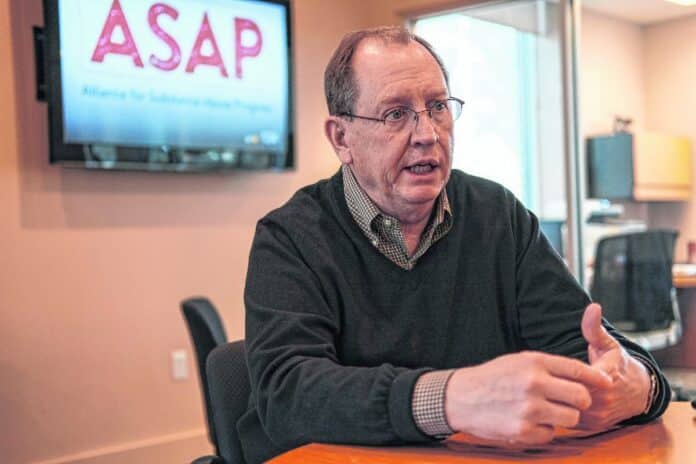
An epidemic of addiction to painkillers, heroin, methamphetamine and other substances that has swept into Bartholomew County and much of the nation is fueling demand for outpatient drug treatment in Columbus.
After six months, Columbus Regional Health’s Treatment and Support Center (TASC), 2630 22nd St., is on pace to see nearly 900 unique patients in its first year — more than seven times higher than CRH’s initial projection of 126 patients and 50% higher than CRH’s five-year estimate of 600 patients.
From July 1 to Feb. 5, a total of 450 unique patients were seen at TASC, with 285 patients actively in treatment as of Feb. 5, said TASC Program Manager Katrina Applegate, who oversees the treatment center’s operations.
“We really did open up a floodgate of people to come in,” she said.
[sc:text-divider text-divider-title=”Story continues below gallery” ]
TASC, which opened its doors July 1, provides a range of outpatient treatments for substance abuse disorders, including medication-assisted treatment in certain cases, according to the treatment center’s website.
Medication-assisted treatment is the combination of medications approved by the U.S. Food and Drug Administration and counseling and cognitive behavioral therapy, including individual or group counseling, family therapy or referrals to other services in the community, according to the National Institute on Drug Abuse.
As of Feb. 5, around half of patients at TASC had sought treatment for heroin or other opioid addictions, nearly 40% for methamphetamine and around 10% for alcohol, Applegate said.
About 55% of the patients were self-referred or referred by a friend or family member, while the remaining 45% of patients were referred by Community Corrections, probation or a drug court, Applegate said.
Around 48% of patients are undergoing medication-assisted treatment involving Suboxone or Vivitrol for opioid or alcohol substance abuse disorder, CRH officials said.
Though TASC’s 17 staff members have been scrambling to keeping up with demand, Applegate said they have not turned away anyone who has sought treatment.
“It has been challenging, Applegate said. “What we have done is that each individual treatment plan is person-centered. Not everyone needs the same type of treatment. I think that’s what has set us apart and helped us with scheduling.”
“We’re working one day at a time and doing the best we can,” she said.
‘A monster still alive and growing’
Local officials who are helping lead Columbus’ community-wide response to the substance abuse epidemic said the higher-than-projected local demand for outpatient drug treatment is evidence of the scope of the problem in the city and surrounding area.
“(The demand) is encouraging in the sense it’s shown that (TASC has) a good design and it’s filling an important need,” said Doug Lenoard, executive director of the Alliance for Substance Abuse Progress, or ASAP. “It’s discouraging in that the disease (of addiction) is much broader than we’d all like to recognize.”
Launched in 2017, ASAP is a community-wide response to address substance abuse, including the opioid crisis, in Bartholomew County.
The ASAP Hub, a 2,000-square-foot recovery resource center located in the Doug Otto Center at 1531 13th St. saw 375 people from September to January, said ASAP Hub Director Nathan Walsh. The facility opened last year for individuals, families and friends who are impacted by substance abuse disorder.
In December, ASAP had 150 cases of individuals or family members who were engaged in some part of the recovery process, Walsh said.
The opening of TASC last year, as well as new daytime treatment program at LifeWorks program at St. Peter’s Lutheran Church that started earlier this month, have increased the local the treatment capacity, though more is needed, ASAP officials said.
“The options are growing in this community and that’s exciting,” Walsh said.
Substance abuse disorder, as well as fatal and non-fatal drug overdoses, have long been an issue in Bartholomew County.
There were 23 fatal drug overdoses in Bartholomew County last year, up from 17 drug overdose deaths in 2018, according to a report from the Bartholomew County Coroner’s Office.
In 11 of the 23 fatal drug overdoses, multiple substances were found, and in 14 of the cases, the cause of death involved opioids, the report states. The coroner’s office found 13 of the overdose cases involved stimulants such as methamphetamine, while eight involved fentanyl or fentanyl analogues and three involved heroin.
Additionally, Bartholomew County residents have visited hospital emergency departments a combined 468 times for non-fatal opioid overdoses from 2011 to 2017. Across the state, opioid overdoses resulted in 26,884 emergency department visits over the same period — or about one visit every 2 hours and 17 minutes every day for seven years.
Leonard, who characterized substance abuse in Bartholomew County as “a monster that is still alive and growing,” said there are still issues with treatment capacity in the community and that ASAP is gathering more data to help the community-wide response.
“We know that demand is much greater than capacity,” Leonard said. ..”We’re climbing a mountain and looking up ahead and we don’t see the top yet.”
[sc:pullout-title pullout-title=”About TASC” ][sc:pullout-text-begin]
Columbus Regional Health’s Treatment and Support Center (TASC), 2630 22nd St., provides a range of outpatient treatments for substance abuse disorders, including medication-assisted treatment in certain cases, according to the treatment center’s website.
Visit crh.org/physician-practices/treatment-and-support-center for more information.
[sc:pullout-text-end][sc:pullout-title pullout-title=”About ASAP” ][sc:pullout-text-begin]
The Alliance for Substance Abuse Progress, or ASAP, is a community-wide response to address substance abuse, including the opioid crisis, in Bartholomew County.
The ASAP Hub is a recovery resource center, located in the Doug Otto Center at 1531 13th St., for individuals, families and friends who are impacted by substance abuse disorder.
Visit www.asapbc.org or call 812-418-8705 for more information.
[sc:pullout-text-end][sc:pullout-title pullout-title=”ASAP open house” ][sc:pullout-text-begin]
The Alliance for Substance Abuse Progress will have an open house at the ASAP Hub, 1531 13th St. in the Doug Otto Center, at 4:30 p.m. Feb. 27.
[sc:pullout-text-end]




